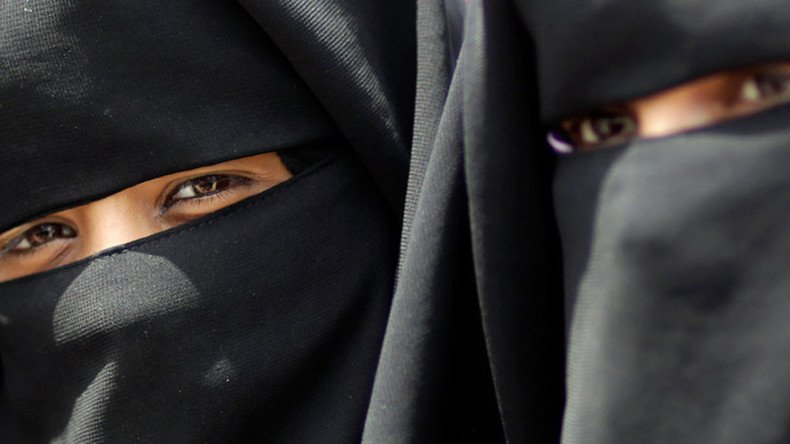European court backs Belgian face veil ban

The European Court of Human Rights (ECHR) upheld Belgium’s ban on wearing Islamic full-face veils or niqab in public places, which was introduced in June 2011. The ban was challenged by two Muslim women.
The Belgian ban “doesn’t violate European human rights law,” the Strasbourg-based court said in a ruling on Tuesday.
Despite calling restrictions controversial, the judges argued they were “necessary in a democratic society."
The ban, which prohibits appearing in public with a face masked or hidden in whole or partially in such a way as to be unidentifiable, was aimed at ensuring social order and the “protection of the rights and freedoms of others,” the ECHR explained.
“The question whether the full-face veil was accepted in the Belgian public sphere was… a choice of society,” the ruling stated.
Penalties for violating the ban, which include a fine and a seven-day prison term for repeat offenders, were also found “proportionate” by the judges.
The case against the Belgian ban was brought to the ECHR by two Muslim women back in 2013.
Belgian national Samia Belcacemi and Yamina Oussar of Morocco said the restrictions violated their rights and discriminated against their decision to wear niqab, which they made “on their own initiative.”
READ MORE: Norway proposes national ban on full-face veils in educational institutions
Belcacemi said that she initially continued wearing the full-face veil after the ban was introduced, but then gave up on doing so due to public pressure and fear of being fined.
Oussar told the court that she “decided to stay at home” after restrictions came into force.
READ MORE: Burqas should be banned because they block Vitamin D from sunlight – UKIP manifesto
The ECHR earlier upheld a similar ban in France, which became the first EU member state to outlaw wearing niqabs in April 2011.
Legislation on the full-face veil in Europe varies across Europe https://t.co/7PlRvHfxgbpic.twitter.com/27xzXpJwMB
— AFP news agency (@AFP) 11 июля 2017 г.
Some areas in Italy, Spain, Switzerland and Bulgaria have also imposed restrictions on wearing niqabs in recent years.
The director of the Muslim Education Centre of Oxford, Dr. Taj Hargey, said his organization “applauded” the ECHR ruling and urged the ban to be expanded to all European countries, including the UK.
Hargey told RT that wearing a full-face veil is tribal tradition, which “has nothing to do with Islam.”
“It’s pre-Islamic… It originated in ancient Persia and it was a custom for the nobility and aristocracy. It’s also non-Koranic. There’s no way that Koran is saying that a woman should, actually, cover her face. In fact, in the pilgrimage to Mecca women are banned from covering their faces,” he said.
The ban is justified not only by religious, but also by social reasons as niqabs prevent cohesion in society; empower Muslin patriarchy and presents a security risk due to being used by men to impersonate women during criminal acts, Hargey said.
The full-face veil is “a big detrimental factor for vitamin D. People get vitamin D from the sunlight. And women when they covered themselves from top to toes… they have grave vitamin D deficiency and have greave health implications for themselves and for the children,” he added.
The General Secretary of the European Muslim league, Yvonne Ridley, was, on the contrary, disappointed with the upholding of the Belgian ban, saying that it was “unhelpful” and grounded in Islamophobia.
Ridley told RT that she believed that “women should be allowed to wear what they chose – whether it’s a lot of clothes or a few.”
She called the ban on niqabs “an attack on a very tiny minority of women. We’re talking probably about hundreds across Europe and barely into double figures in Belgium.”
Ridley also turned down the argument that full-face veils had to be outlawed in order to prevent oppression of Muslim women by authoritarian males.
“If this garment was enforced on them (women) then at least they could’ve gotten out in the street. Now that it’s become illegal… these women will be trapped in their homes if indeed they’re being forced to wear these veils as a symbol of oppression. And we won’t get to see them. They’ll be hidden away,” she explained.













